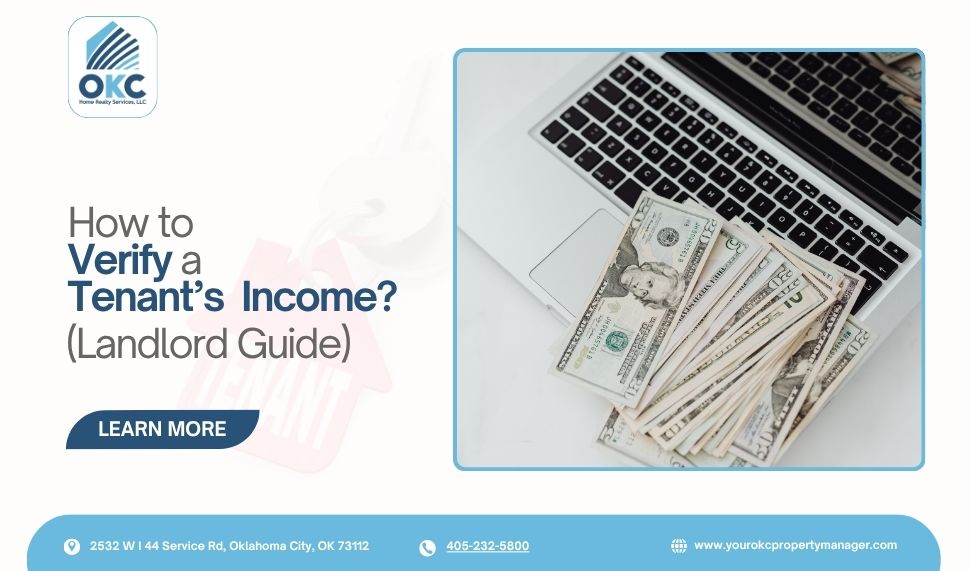Handing over your rental property keys only to learn your tenant can’t actually afford the rent. Stressful, right? That’s exactly why verifying a tenant’s income through proper proof of income documentation isn’t optional. It’s a critical step that protects your property, cash flow, and long-term stability as a landlord. When you confirm a tenant’s income correctly, you avoid late payments, evictions, and financial losses that can cripple your entire rental business.
In today’s rental market, relying on a single pay stub is no longer reliable proof on its own. With the rise of online templates and digital editing tools, fake proof of income documents are increasingly common. According to the National Multifamily Housing Council (NMHC), 84.3% of property managers have encountered fraud during the tenant screening process, with fake income verification documents being the most common issue. That number isn’t just a statistic, it’s a wake-up call for any landlord still relying on a quick glance at paperwork.
With over 20 years of experience in property management, I’ve seen how proper income verification helps landlords maintain stable, long-term tenancies. In this article, you’ll learn which proof of income documents are most reliable, how to spot fake documentation, what legal requirements you must follow, and how to handle tricky situations like self-employed applicants.
What is Proof of Income for Rental Applications?
Proof of income refers to official documentation that demonstrates a tenant’s financial capacity to meet their rental obligations. Legally, it represents verifiable evidence of earned income through employment, self-employment, or benefits. These documents go beyond simply showing numbers on paper; they reveal payment patterns, job consistency, and whether someone can realistically afford your rental property without financial strain.
According to the U.S. Department of Housing and Urban Development (HUD), income verification must be based on “a review of reliable source documentation, such as wage statements,” to accurately assess a prospective tenant’s ability to pay rent consistently.
The key is understanding that proof of income isn’t just about meeting a minimum dollar amount; it’s about establishing trust and confidence that your tenant can pay rent on time, every time, throughout the entire lease agreement.
Why is Income Verification Important for Landlords?
Income verification is your financial shield against one of the costliest mistakes in property management; renting to tenants who can’t afford your property. For landlords, it’s a safeguard against payment defaults, eviction costs, and property damage risks. Here are the major reasons why verifying a tenant’s income is important:
- Affordability Assessment: The primary reason to verify tenant income is to ensure that the tenant can afford the rent. A common benchmark is the 30% rule, which suggests that no more than 30% of a tenant’s income should go toward rent. You can verify tenant income meets your rent-to-income ratio requirements before signing any lease, preventing problems before they start.
- Stability and Reliability: Verifying income helps landlords assess the stability and reliability of a tenant’s financial situation. Regular steady income suggests that the tenant will be able to pay rent consistently over the term of the lease.
- Legal and Policy Compliance: Fair housing laws require consistent tenant screening criteria for all applicants. Documented income verification protects you from discrimination claims by showing you apply the same standards to everyone.
- Comparison Among Applicants: When multiple applications are received for a property, verifying income can help landlords compare applicants on a more objective basis. This allows for a fair assessment of which applicant is most financially stable and capable of affording the rent.
- Preventing Fraud: Verifying a tenant’s income also serves as a prevention of fraud. It helps ensure that the information provided by a tenant about their income is accurate and truthful, protecting the landlord from entering into a lease based on false information.
- Long-term Tenancy Viability: Tenants who can comfortably afford their rent are more likely to be satisfied and remain in their rental longer, reducing turnover rates and the costs associated with finding new tenants.
12 Types of Proof of Income Documents Landlords Should Accept
After two decades in property management, I’ve learned that no single document tells the full financial story of a tenant. Not all income looks the same, and that’s okay. Your perfect tenant might be a traditional W-2 employee, a freelancer, or someone living on retirement benefits. Here are the 12 most reliable proof of income documents you should accept during your tenant screening process:
1. Pay Stubs
Pay stubs are your go-to document for traditional employees. Request at least two to three consecutive months of recent pay stubs to verify consistent employment and income. They show gross earnings, deductions, taxes, and net take-home pay; everything you need to calculate if they meet your income requirements. Just remember: pay stubs are also the most commonly faked documents, so always cross-reference with bank statements.
2. W-2 Tax Forms
W-2 forms show total annual wages reported to the IRS, giving you a reliable snapshot of last year’s income. They’re perfect for verifying stable employment history and catching any income discrepancies. To estimate monthly earnings, simply divide the annual total by 12. Request W-2s from the past one to two years for the most complete picture. They’re harder to fake than pay stubs since they’re official IRS documents, making them one of your most trustworthy verification tools.
3. Tax Returns (Form 1040)
IRS Form 1040 provides a complete snapshot of annual income from all sources like employment, freelance work, investments, and rental income combined. It’s especially valuable for self-employed applicants or those with multiple income streams. Request the past two years of tax returns to assess income trends and financial stability. Applicants can obtain official copies directly from the IRS as transcripts, which are harder to forge than photocopies, giving you extra security against fraud.
4. 1099 Forms (MISC, NEC, K)
Independent contractors and self-employed applicants use 1099 forms to report non-salary income from freelance work, contract positions, or business income. These IRS forms show exactly what they earned from each client or income source. If applicants receive money from assets or royalties, they’ll submit 1099s to prove their earnings. For self-employed tenants, request 1099s from the past two years alongside bank statements to verify income consistency and stability over time.
5. Bank Statements
Bank statements offer a real-world look at cash flow, showing regular deposits and overall financial habits. Request three to six months of statements for applicants with non-traditional income like freelancers or gig workers to confirm consistent earnings over time. They reveal not just income deposits but also spending patterns and financial responsibility. However, tenants may hesitate due to privacy concerns so you need to know how to request bank statements appropriately.
6. Employment Verification Letters
An employment verification letter is a formal document from the applicant’s employer confirming job status and income. It should be on official company letterhead and include the tenant’s position, start date, salary or hourly wage, and contact information for verification.
7. Profit and Loss Statements
Self-employed tenants and small business owners often can’t provide traditional pay stubs, but they can share profit and loss statements from their business. These documents show business revenue, expenses, and net income over specific periods, typically monthly or quarterly. Pair these with tax returns and bank statements for a complete financial picture.
8. Social Security and Disability Benefits Statements
A Benefit Verification Letter from the Social Security Administration (SSA) lists monthly benefits income received through disability, retirement, or Supplemental Security Income (SSI). These are reliable, consistent income sources backed by the federal government. Applicants can request official letters directly from the SSA showing their exact monthly benefit amount.
9. Pension and Retirement Income Statements
Retirees receiving pension payments or withdrawing from retirement accounts can provide monthly or quarterly statements from their pension fund or financial institution. These documents show regular income distributions and account balances. Retirement income is typically stable and predictable, making retirees excellent long-term tenants. Just verify the income is sufficient to cover rent comfortably without depleting their savings too quickly.
10. Court-Ordered Payments
Rental income receipts and court-ordered payments like alimony or child support can serve as proof of income if they’re regular and reliable. Request official court documents showing the payment amount and frequency, plus recent bank statements demonstrating consistent deposits. These income sources can be counted toward qualifying income as long as they’re legally mandated and verifiable. However, since payment reliability varies, consider requiring additional documentation or a slightly higher income cushion to ensure rent affordability throughout the lease term.
11. Unemployment Benefit Statements
For tenants temporarily unemployed, unemployment benefit statements can demonstrate short-term income stability. However, you should assess the expiration date of benefits and verify reemployment potential before final approval.
12. Offer Letters and Employment Contracts
For tenants starting new jobs who don’t have pay stubs yet, an official offer letter or employment contract can verify future income. The letter should be on company letterhead, including start date, position, and annual salary or hourly wage. Consider requesting the first month’s pay stub after move-in or asking for a larger security deposit to offset risk.
How to Verify a Prospective Tenant’s Income: Step-by-Step Process for Landlords
Income verification isn’t complicated when you follow a structured process. Here’s exactly how to verify tenant income from start to finish, with each step designed to give you confidence in your decision while staying legally compliant.
Step 1: Set Your Income Requirements Before Screening
The industry standard is the 3:1 income-to-rent ratio, meaning applicants should earn at least three times the monthly rent. Document this requirement in your rental application and advertise it clearly in your listing. This transparency filters out unqualified applicants before they waste your time, and it demonstrates fair, consistent standards that protect you from discrimination claims under fair housing laws.
Step 2: Collect Signed Authorization Forms
Never verify income without written permission. You must obtain signed authorization from applicants to contact current or former employers to verify employment details. Have applicants sign consent forms allowing you to contact employers, request financial documents, and run background checks. This protects you legally and shows applicants you’re conducting professional, by-the-book screening.
Step 3: Request Multiple Income Documents
Don’t rely on a single document; request at least two to three different types of proof. For traditional employees, ask for recent pay stubs, a W-2 form, and bank statements. Self-employed applicants should provide tax returns, profit and loss statements, and bank records. The more documentation you collect, the harder it becomes for dishonest applicants to maintain fabricated stories.
Step 4: Calculate Monthly Income from Documents
Do the math yourself; don’t just trust the numbers applicants provide. For pay stubs, multiply the gross pay by payment frequency. For annual documents like W-2s or tax returns, divide by 12 to get monthly income. Include only reliable, consistent income sources in your calculations.
Step 5: Verify Employment Directly with Employers
Don’t just accept employment letters at face value; make a follow-up call to confirm details are accurate and legitimate. Contact the employer to verify job title, hire date, salary, and current employment status. Ask if the position is permanent or temporary, and whether income is guaranteed or commission-based.
Step 6: Verify Self-Employed and Non-Traditional Income
Self-employed applicants require extra scrutiny. Request bank statements for at least three to six months to establish an income history and verify deposits match claimed earnings. Ask for two years of tax returns including all schedules to see their full financial picture. Contact their CPA or accountant to verify tax documents are legitimate. Self-employment income often fluctuates, so look for averaging trends.
Step 7: Run a Credit Check for Additional Verification
A credit check doesn’t show income explicitly, but it reveals financial obligations and payment history that indicate financial stability. Strong credit scores suggest responsible financial management, while excessive debt or late payments raise concerns about their ability to pay rent on time.
Legal Considerations When Requesting Proof of Income
Income verification isn’t just good business practice; it’s legally protected territory you need to navigate carefully. When requesting proof of income, you must comply with federal, state, and local housing laws to ensure fair and lawful tenant screening. The Fair Housing Act (FHA) prohibits discrimination based on race, color, religion, sex, national origin, familial status, or disability. This means every applicant must be asked for the same documentation and evaluated under identical standards.
In Oklahoma City, landlords must also follow the Oklahoma Residential Landlord and Tenant Act (ORLTA). Under this act, any information collected, such as income verification documents, must be handled with confidentiality and used solely for rental eligibility decisions. Under Oklahoma law (Title 25 §25-1452), landlords cannot refuse to consider valid sources of income like public assistance, alimony, or child support awarded by a court when those sources can be verified. This means if someone receives Section 8 vouchers or disability benefits, you must evaluate them using the same income standards you’d apply to traditionally employed tenants.
Always obtain written consent before contacting employers or requesting financial documents. Apply your screening criteria consistently, document everything thoroughly, and focus solely on financial qualifications.
How to Spot Fake Proof of Income?
A survey conducted between November 15, 2023, and January 9, 2024, by the National Multifamily Housing Council stated that 84.3% of respondents have experienced fraud. The most common type of fraud was fake proof of income, such as fake or falsified pay stubs, employment references, and other forms of income documentation. That’s why knowing how to spot fraudulent documents isn’t optional anymore; it’s essential for protecting your investment.
1. Check Document Consistency
Look for dissimilarity in the format of documents (e.g., pay stubs, bank statements). Genuine documents typically have a consistent and professional layout. Verify that the information (e.g., employer name, dates, amounts) is consistent across different documents provided by the tenant.
2. Contact Employers Directly
Reach out to the tenant’s employer using contact information obtained independently (not from the tenant) to verify their employment status, position, and income.
3. Analyze Bank Statements
Look for unusual deposit patterns that don’t match the claimed income. Regular, consistent deposits are a good sign, while large, irregular deposits may raise suspicion. Check for withdrawals that seem inconsistent with the tenant’s claimed income level, such as excessive spending.
4. Review Tax Documents
Request recent tax returns (e.g., W-2, 1099 forms) to verify annual income. Ensure that the income reported aligns with what is claimed in other documents. For added security, you can ask for an IRS transcript, which can confirm reported income directly from the tax authority.
5. Utilize Credit Reports
Performing a credit check can provide insights into the tenant’s financial history and stability, helping to confirm their income claims.
What to Do If Your Tenant Has No Proof of Income?
Sometimes you find an applicant who seems perfect in every way except they can’t provide traditional income documentation. Maybe they’re self-employed, recently relocated, or starting a new job. Before you automatically reject them, here are practical solutions that protect your investment while giving good tenants a fair chance.
1. Request Alternative Documentation
If traditional proof of income like pay stubs or tax returns is not available, consider asking for other types of documentation that can demonstrate financial stability. This might include bank statements showing consistent income deposits, letters from employers, or proof of assets.
2. Consider a Co-signer or Guarantor:
If the tenant’s income is uncertain, requiring a co-signer or guarantor can provide an additional layer of security. This person should have a stable income and good credit history, and they would be responsible for the rent if the tenant fails to pay.
3. Higher Security Deposit
Requesting a higher security deposit can help reduce the risk of potential unpaid rent. This provides you with a financial buffer but ensures that this practice complies with local laws and regulations regarding rental agreements.
4. Prepaid Rent
Depending on the tenant’s situation, you might negotiate prepaid rent for several months in advance. This can be a viable option for tenants who have the financial means but need more traditional income proof.
5. Regular Payment Verification
For ongoing tenancies, you could set up a system where the tenant agrees to periodic verification of their financial situation. This could involve regular checks of bank statements or other financial documents.
Why Smart Landlords Trust Property Managers for Income Verification
Verifying a tenant’s income is a crucial step in ensuring you find reliable renters who can meet your leasing criteria. By taking the time to assess their financial stability, you can protect your investment and create a smoother renting experience.
Tenant income verification takes time, expertise, and constant vigilance. Between checking multiple documents, calling employers, cross-referencing bank statements, and staying compliant with evolving fair housing regulations, it’s easy to miss red flags or make costly mistakes.
That’s where OKC Home Realty Services comes in. We handle comprehensive tenant screening, income verification, and legal compliance so you don’t have to stress about fake pay stubs or discrimination lawsuits. Our experienced team knows exactly what to look for, how to verify it properly, and how to protect your investment while finding quality tenants who pay on time.
Ready to make your tenant screening easier? Call us at (405) 232-5800 or visit www.yourokcpropertymanager.com to learn how we make property management effortless for Oklahoma landlords.
Frequently Asked Questions
Are landlords allowed to ask for proof of income?
Yes, landlords can legally request proof of income from all applicants as part of the tenant screening process. However, you must apply the same income requirements consistently to every applicant to comply with fair housing laws.
What can be used for income verification?
Common documents include recent pay stubs, W-2 or 1099 tax forms, bank statements, employment verification letters, tax returns, Social Security or disability benefit statements, and profit and loss statements for self-employed applicants.
Is it possible to rent without proof of income?
Yes, tenants without traditional income proof can still rent by providing a cosigner or guarantor, paying higher security deposits, offering prepaid rent, or submitting alternative documentation like bank statements showing consistent deposits.
How to obtain proof of income?
Tenants can request documents directly from your employer (pay stubs, employment letters), download tax forms from the IRS website, print bank statements from online banking portal, or obtain benefit statements from the Social Security Administration or pension providers.

Author
Scott Nachatilo is an investor, property manager and owner of OKC Home Realty Services – one of the best property management companies in Oklahoma City. His mission is to help landlords and real estate investors to manage their property in Oklahoma.
 (
(









